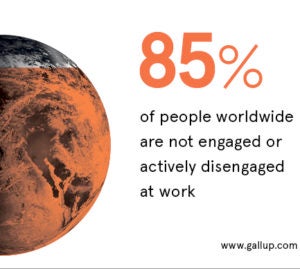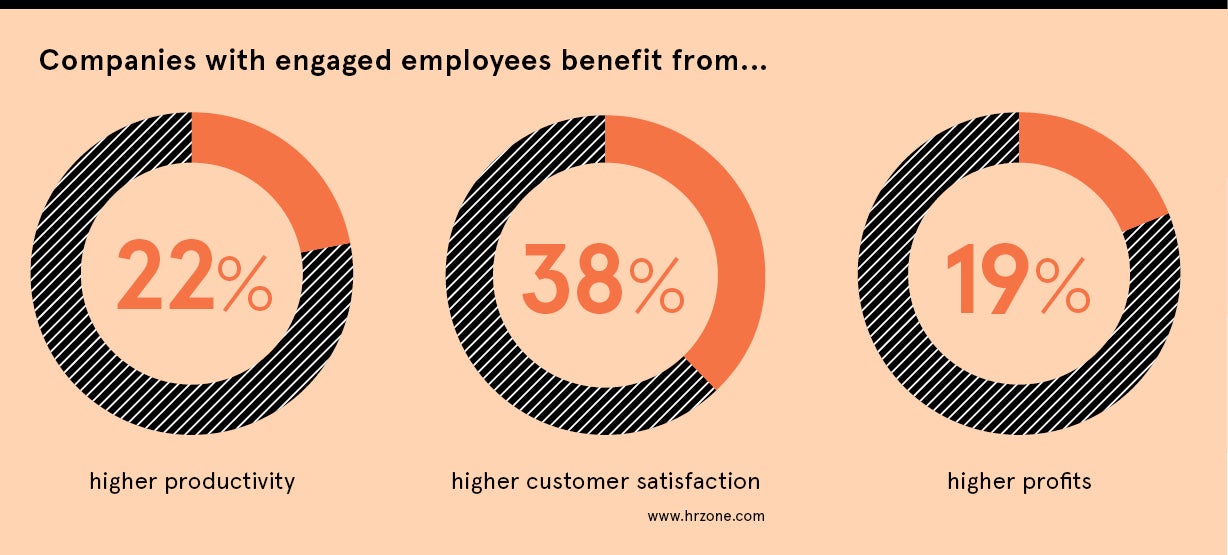A term that’s been knocking about since the nineties, employee engagement has moved to the forefront of company agendas having become, according to Deloitte, “the top issue on the minds of business leaders, directing us to an entirely new model of management”.
Why the rise in concern? Reports from researchers such as Gallup have prompted a shift, finding high-scale mismanagement has seen a dip in business productivity. With nearly 85 per cent of employees reportedly disengaged at work, it’s no wonder interest in more effective management techniques has become a hot topic. No matter the industry, businesses running with high numbers of disengaged staff are more likely to run into obvious problems, such as loss of output and stagnated growth.
 In much the same way as customer experience, 20 years ago employers focused solely on the tangible elements of the employment process. Monetary gain was pretty much the sole reward for an employee’s efforts, with the occasional target-driven bonus thrown in to increase motivation. Now the modern employee expects at least something in the way of non-tangible reward, whether that’s flexible working, healthcare services or personal development plans. The employment relationship is no longer a one-way transaction of cash.
In much the same way as customer experience, 20 years ago employers focused solely on the tangible elements of the employment process. Monetary gain was pretty much the sole reward for an employee’s efforts, with the occasional target-driven bonus thrown in to increase motivation. Now the modern employee expects at least something in the way of non-tangible reward, whether that’s flexible working, healthcare services or personal development plans. The employment relationship is no longer a one-way transaction of cash.
According to the State of the Global Workplace Gallup report, the economic consequences of global disengagement is a massive $7 trillion in lost productivity. When it’s broken down, the link seems obvious that how employees behave will have an impact on the employer’s success.
Because of this, more and more organisations are examining how engagement strategy can benefit them. Businesses are increasingly finding value in areas such as management training, personal development plans and non-monetary reward packages. Findings by the McKinsey Global Institute and others show how funding areas like these is advantageous, with a noted 20 to 25 per cent productivity increase in organisations with engaged employees.
As can be presumed, if your workforce is engaged and is therefore more productive, it will have an impact on the customer experience. Picture this: if an employee has no support from managers, no responsibility and is just getting through each day as it comes without being fully invested in the company, are they going to be as enthusiastic as they can be when meeting a customer? Probably not.
However, if they are engaged and they do have the right support in place and understand completely how their role fits in with the company vision, when the employee spends time with customers they are more likely to try and spread this enthusiasm to work well or secure a sale. Study after study has shown that investing in employee engagement can generate a higher return on investment for the company.
Through regular one-to-ones with line managers, giving employees adequate responsibility alongside all the additional perks should help to create an efficient and effective workforce. If your employees understand how their role fits in with the bigger picture, and see you wanting to invest in them and their career, then they are more likely to produce better results and feel a greater commitment towards the company doing well. It’s not surprising that companies with engaged employees see 22 per cent higher productivity, 38 per cent higher customer satisfaction and up to 19 per cent higher profits.
Study after study has shown that investing in employee engagement can generate a higher return on investment for the company
The tide of management is turning, and more and more business leaders are investing in employee engagement techniques to reap the mutual benefits of employee satisfaction and its by-product of increased job performance.
In a competitive job market, employees are shopping for the right workplace culture and employee experiences that best suit them. Zenefits found that more than 70 per cent of employees agreed that fringe benefits would be a key consideration in evaluating future jobs. It’s a bit of a “what have you done for me lately” mindset and that’s exactly why a culture that focuses on employee engagement is so critical. Happy, satisfied, challenged, learning, growing employees stick around. They are happy in their jobs and it shows, leading to increased work performance.
But the employee experience is not just about human resources, it’s not about your company touting what a great place it is to work, and it’s not just about how many employees are engaged socially and supporting the brand. Employee experience is not about perks, ping-pong tables, free lunches or the availability of nap pods in every corner.
Your business needs to be projecting itself in a positive light even before the start of the recruitment process, developing your company culture and a sense of community, as well as offering incentives that matter.
At Growth Partners, we believe it is paramount to set a standard, and lead the way when it comes to matters of employee experience and engagement. Which is why we have developed our SMART Employment model. This isn’t just a new management structure, but an example of how you should be engaging your employees.
Our tried and tested services provide elements of financial support, financial security, wellbeing support and stress relief. Away from simply paying an employee a salary, we care about the other factors influencing staff welfare. By doing this, employees feel secure and valued, making them want to go out to customers and act as an advocate for the way your company runs.
One of the giant takeaways from the heavily researched topic of employee engagement is to treat your employees almost as if they are a customer of your business. Instead of exchanging money for a product or service, they are offering up their skills, knowledge and efforts to buy in to your business and to what you can offer them.
Business success stems from the employees. Without them, you wouldn’t be able to get far down the path you are going. They build the foundation of your mission and values. They sell your products, promote your company values and generally get the job done. So, why wouldn’t you invest in them?
To find out more about how Growth Partners can help grow your business please call 0116 340 3116 or visit www.growthpartnersplc.co.uk


